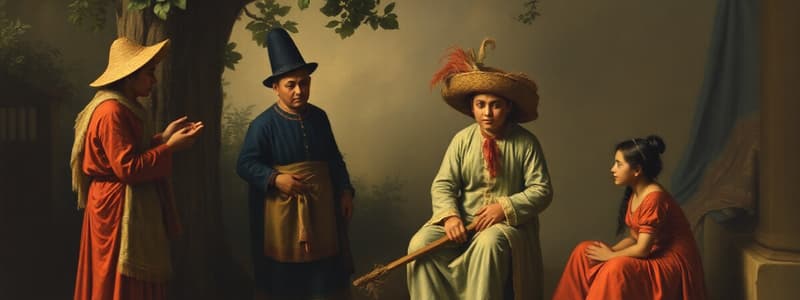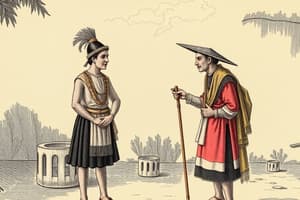Podcast
Questions and Answers
Who is described as the maker of everything among the ancient Tagalogs?
Who is described as the maker of everything among the ancient Tagalogs?
- Bathala (correct)
- Lacapati
- Tigmamanuguin
- Dian Masalanta
Which deity is associated with love, childbirth, and the protection of lovers?
Which deity is associated with love, childbirth, and the protection of lovers?
- Hocloban
- Bathala
- Dian Masalanta (correct)
- Lacapati
What role does the Catolonan play in ancient Tagalog society?
What role does the Catolonan play in ancient Tagalog society?
- Healer
- Priest (correct)
- Witch
- Fortune teller
Which figure is known for causing infertility and sickness among the ancient Tagalogs?
Which figure is known for causing infertility and sickness among the ancient Tagalogs?
Which creature is associated with both destruction and healing, as well as having the power to destroy homes?
Which creature is associated with both destruction and healing, as well as having the power to destroy homes?
What happens if a debtor fails to repay their debt under the historical usury practices?
What happens if a debtor fails to repay their debt under the historical usury practices?
Which of the following conditions could lead to a slave renouncing their status?
Which of the following conditions could lead to a slave renouncing their status?
What is emphasized as a key takeaway regarding inheritance rights?
What is emphasized as a key takeaway regarding inheritance rights?
What is meant by the term 'bigay-kaya' in the context of marriage?
What is meant by the term 'bigay-kaya' in the context of marriage?
Which principle is emphasized in the historical laws of inheritance?
Which principle is emphasized in the historical laws of inheritance?
What role do arbiters from other villages play in dispute resolution?
What role do arbiters from other villages play in dispute resolution?
What was required from the husband's family when marrying a chief's daughter?
What was required from the husband's family when marrying a chief's daughter?
What are the potential penalties for insulting the datu's family?
What are the potential penalties for insulting the datu's family?
What happens to someone who fails to pay their fines?
What happens to someone who fails to pay their fines?
What does 'panghihimuyat' refer to in the marriage customs discussed?
What does 'panghihimuyat' refer to in the marriage customs discussed?
What could help a debtor avoid being enslaved due to unpaid debts?
What could help a debtor avoid being enslaved due to unpaid debts?
Which deity is known to be associated with ceremonial practices among the Tagalogs?
Which deity is known to be associated with ceremonial practices among the Tagalogs?
What is described as a temporary structure in the worship practices of the Tagalogs?
What is described as a temporary structure in the worship practices of the Tagalogs?
Which of the following statements is accurate regarding the consequences of committing a crime historically?
Which of the following statements is accurate regarding the consequences of committing a crime historically?
Who is recognized as the most powerful spiritual figure in Tagalog beliefs?
Who is recognized as the most powerful spiritual figure in Tagalog beliefs?
What role does the Tigmamanukan hold in Tagalog spiritual beliefs?
What role does the Tigmamanukan hold in Tagalog spiritual beliefs?
Who authored the document that preserved pre-colonial Filipino traditions?
Who authored the document that preserved pre-colonial Filipino traditions?
What does the document 'Customs of the Tagalogs' primarily provide insight into?
What does the document 'Customs of the Tagalogs' primarily provide insight into?
What was Fray Juan de Plasencia's role in relation to the native population?
What was Fray Juan de Plasencia's role in relation to the native population?
Which social class in pre-colonial Philippine society was described as having specific rules regarding inter-village movement?
Which social class in pre-colonial Philippine society was described as having specific rules regarding inter-village movement?
How does the document describe the status of slaves in pre-colonial society?
How does the document describe the status of slaves in pre-colonial society?
What type of societal organization is emphasized in the document 'Customs of the Tagalogs'?
What type of societal organization is emphasized in the document 'Customs of the Tagalogs'?
What was one of the significant contributions of Fray Juan de Plasencia aside from writing the document?
What was one of the significant contributions of Fray Juan de Plasencia aside from writing the document?
What was one misconception about Filipinos before the arrival of the Spanish that the document aims to refute?
What was one misconception about Filipinos before the arrival of the Spanish that the document aims to refute?
Flashcards
Dato
Dato
The head of a village, often seen as needing reform by Fr. Plasencia.
Maharlicas
Maharlicas
A free class in Tagalog society, with rules about moving between villages and who they could marry.
Slaves (Alipin)
Slaves (Alipin)
Individuals held in servitude, divided into two categories: alipin namamahay and alipin saguiguilir.
Alipin Namamahay
Alipin Namamahay
Signup and view all the flashcards
Alipin Saguiguilir
Alipin Saguiguilir
Signup and view all the flashcards
Barangay
Barangay
Signup and view all the flashcards
Doctrina Cristiana
Doctrina Cristiana
Signup and view all the flashcards
Customs of the Tagalogs
Customs of the Tagalogs
Signup and view all the flashcards
Bathala
Bathala
Signup and view all the flashcards
Dian Masalanta
Dian Masalanta
Signup and view all the flashcards
Catolonan
Catolonan
Signup and view all the flashcards
Mancocolam
Mancocolam
Signup and view all the flashcards
Manyisalat
Manyisalat
Signup and view all the flashcards
Usury in Ancient Philippine Society
Usury in Ancient Philippine Society
Signup and view all the flashcards
Renouncing Slave Status
Renouncing Slave Status
Signup and view all the flashcards
Dowries in Ancient Philippine Society
Dowries in Ancient Philippine Society
Signup and view all the flashcards
Himaraw
Himaraw
Signup and view all the flashcards
Panghihimuyat
Panghihimuyat
Signup and view all the flashcards
Bigay Suso
Bigay Suso
Signup and view all the flashcards
Inheritance Laws in Ancient Philippine Society
Inheritance Laws in Ancient Philippine Society
Signup and view all the flashcards
Dowry for Chief's Daughter
Dowry for Chief's Daughter
Signup and view all the flashcards
Dispute Resolution in Barangays
Dispute Resolution in Barangays
Signup and view all the flashcards
Penalties in Tagalog Society
Penalties in Tagalog Society
Signup and view all the flashcards
Debt and Enslavement in Tagalog Society
Debt and Enslavement in Tagalog Society
Signup and view all the flashcards
Catolonan: Highest Religious Authority
Catolonan: Highest Religious Authority
Signup and view all the flashcards
Simbahan: Tagalog Temples
Simbahan: Tagalog Temples
Signup and view all the flashcards
Tagalog Deities
Tagalog Deities
Signup and view all the flashcards
Spiritual Figures in Tagalog Society
Spiritual Figures in Tagalog Society
Signup and view all the flashcards
Tigmamanukan: A Symbolic Bird
Tigmamanukan: A Symbolic Bird
Signup and view all the flashcards
Study Notes
Document Overview
- Authored in 1589 by Fray Juan de Plasencia, a Franciscan missionary.
- Included in The Philippine Islands (1903) and the Philippine Journal of Sciences (1958).
- Preserves pre-colonial Filipino traditions, acting as an early civil code.
Author Background
- Fray Juan de Plasencia (Juan Portocarrero), a 16th-century Franciscan missionary.
- Arrived in the Philippines in 1578, playing a key role in early evangelization.
- Founded towns, authored religious and linguistic works, including the first book printed in the Philippines (Doctrina Cristiana).
- The text presents a different, more positive perspective of his role than some portrayals of Spanish colonizers.
Historical Relevance
- "Customs of the Tagalogs" provides insights into pre-colonial Philippine society.
- Displays a structured societal organization, contradicting narratives of a primitive or uncivilized population.
- Offers evidence of pre-colonial civilization and preserved traditions.
- Provides important details about the barangay, the fundamental social and political unit.
Content Analysis: A Structured Approach
Government and Social Structure
- Dato: The village chief, needing reform according to Fr. Plasencia. Described his authority, limitations, and judicial role.
- Maharlicas: The free class, with regulations on inter-village movement and marriage. Their social mobility and inheritance laws are described.
- Slaves (Alipin): Two categories: alipin namamahay (relatively free) and alipin saguiguilir (servants). Includes acquisition and release processes (inheritance, debt, war, crime).
- Acquisition of slave status: Inheritance, prisoners of war or crime. Debt-based slavery: land or profit forfeited until debt repaid. This was inheritable.
Marriage and Inheritance
- Dowries (Bigay-kaya): An intricate system of gifts exchanged between families, highlighted for its economic and social significance.
- Inheritance Laws: The rules are illustrated with case studies, emphasizing how social class and parental status affected the distribution of property.
Dispute Resolution & Penalties
- Dispute Resolution: Processes for resolving disputes between individuals and barangays were described, highlighting the role of impartial arbiters from other villages.
- Penalties: Involved varying punishments like death, fines, and slavery. The connection between unpaid fines and enslavement is highlighted. Penalties for insulting the Dato's family emphasized social hierarchies.
Religious Beliefs and Practices
- Worship: The text describes Tagalog religious practices including temples, rituals, and various deities (Bathala, Dian Masalanta, Lacapati).
- Idols and Deities: Key deities and their roles are identified, giving insight into the Tagalog pantheon.
- Spiritual Figures: Various spiritual figures (healers, sorcerers, those who could inflict illness) are identified. Catolonan as a powerful figure is mentioned.
Studying That Suits You
Use AI to generate personalized quizzes and flashcards to suit your learning preferences.




